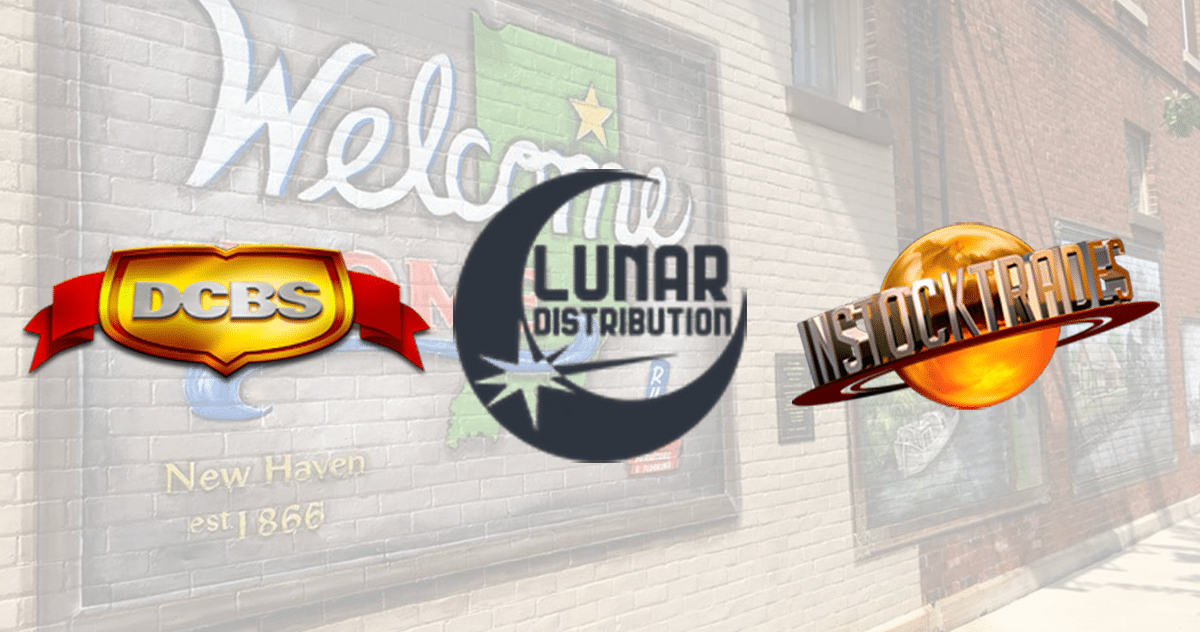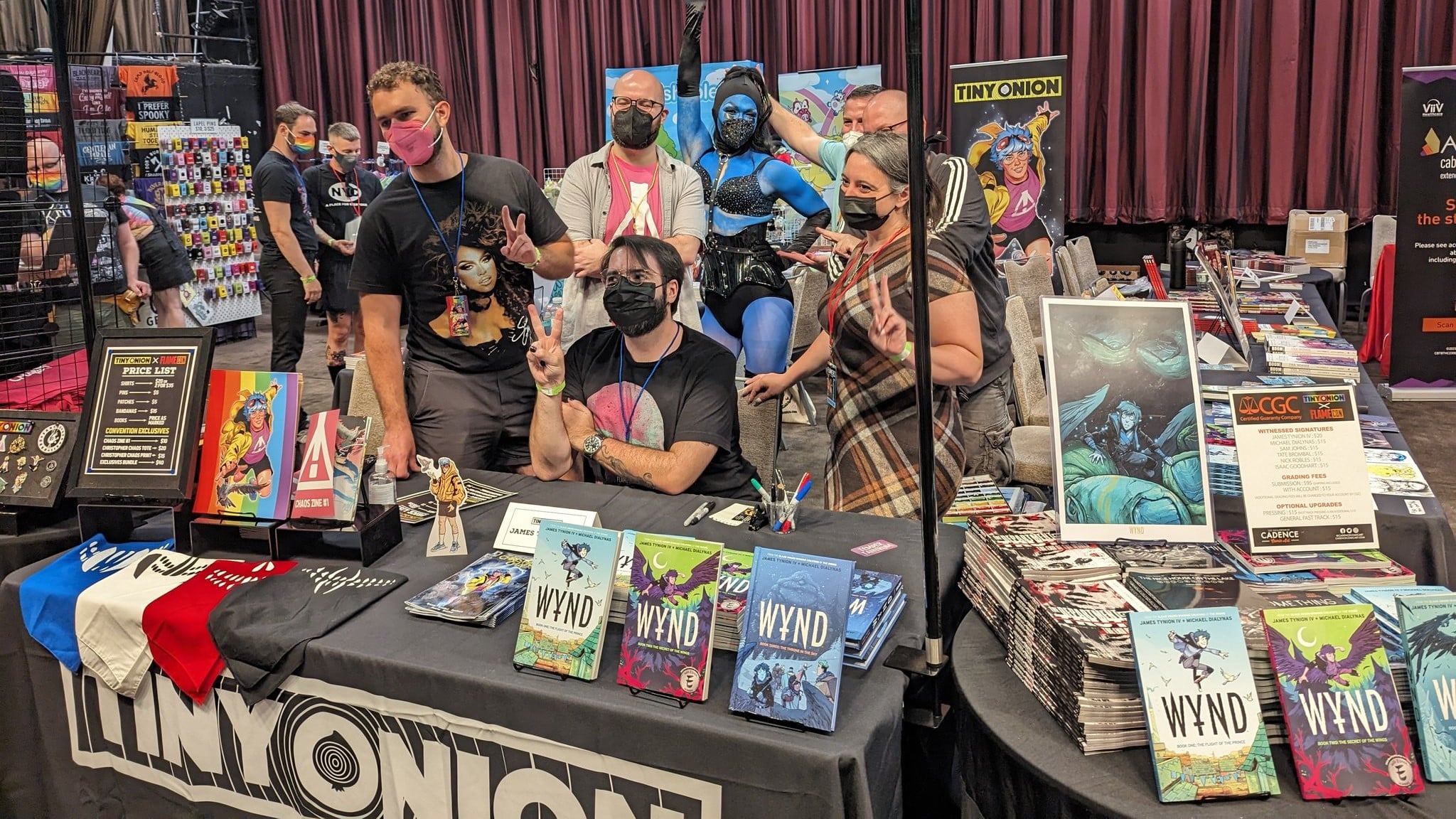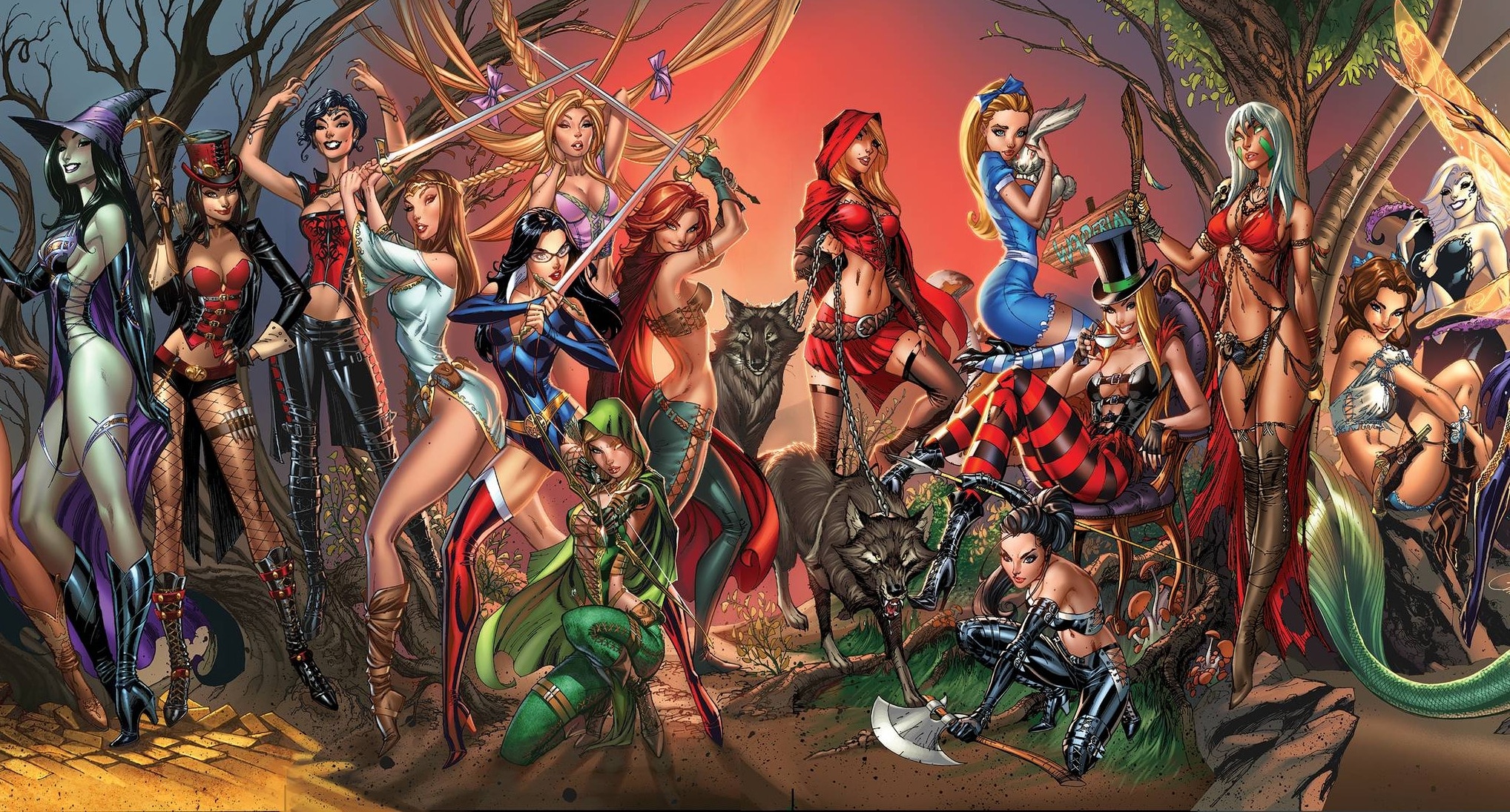Christina Merkler is the co-owner of Lunar Distribution, DCBS and InStockTrades. She sat down with ComicsXF to discuss the ongoing supply chain crisis as well as pivoting her business into being the primary distributor of DC Comics to the Direct Market.
ComicsXF: Christina you are the owner of a Lunar Distribution the main distributor for DC Comics in the periodicals market since April 2020, as well as a handful of other publishers. You previously had the infrastructure to jump in for distribution through DCBS, which you also run. What’s been the biggest change to your day to day going from managing a retail establishment doing a lot of mail order versus being a full fledged distributor for one of the largest players in the business?
Christina Merkler: It hasn’t changed that much as far as general duties. The thing that’s changed the most is learning about trucking. DCBS was direct to consumer but we dealt with getting freight shipments every week through Diamond [Ed. note: The distribution company that previously had a monopoly on the direct market comics industry]. Obviously a lot’s changed in general because of Lunar being created, but also DCBS’ businesses changed considerably as well. When you have a distributor that essentially turns into three distributors, then that greatly affects your ability to do business even on your retail site. Every retailer is dealing with that right now.
We’re constantly upgrading the website to get it to where it needs to be. DCBS is at a really good place because we spent the last 22 years getting it there. Retailers need different things than what customers do, but we can translate a lot of the things that help us on our admin side that we already did on the side of DCPS and InStockTrades . We’ll go to our developer and say, “Hey, we really need to make this easier for us to do.” And usually he had already done that on the other sites. But that’s probably been the biggest change, regrowing a business. DCBS has never really stopped growing. InStockTrades certainly hasn’t stopped, it’s just been this steady progression. Lunar was, you know, a holy crap moment, then another holy crap moment, a few months later taking on everyone else.
CXF: Initially you guys were only handling the west region of the US?
Christina: Right. And we were handling it during the pandemic in which 40 to 50% of the stores were closed. So we were dealing with a few hundred accounts. Then once Diamond came back, and then DC cut ties with Diamond, we had to deal with a thousand accounts all of a sudden. And then we doubled again in January when we became the only distributor and we’ve actually steadily increased. We have almost 300 new accounts that have been opened in the last 10 months. So it’s a growing in both brick and mortar and online retail.
CXF: One complaint that you hear from retailers in general is this proliferation of distributors. Going from Diamond, being the primary periodical distributor to now having yourself, Penguin Random House and Diamond all managing different systems for ordering, receiving, FOC, etc. What’s Lunar doing to streamline that process to make it easier for your retailers?
Christina: From the beginning, we have looked at it from a retailer standpoint. The biggest time suck for a retailer is being able to reorder product and being able to just find out what’s available and what needs to be ordered by what time. Our ordering system is incredibly easy. Probably the only obstacle is that the majority of retailers all have very different systems that they need to get that data into. We do our best to make sure they have all of the fields that they need so that they can rearrange their spreadsheets in a way that they can make it compatible with their systems.
We make it very easy to see where your orders are, to see where your shipments are, where your invoices are and make sure that you know exactly what you’re paying for each box that’s going out the door. We even give you the ability to see that tracking the moment that it’s been created. So those are things that were not easily found in Diamond’s system, especially tracking. We’re a freight shipper, so we never got our tracking. We would just wait for the shipment to show up.
It’s a completely different way that everyone is doing business right now and you really need those tracking numbers. You really need to know where those shipments are because there is such an issue with the supply chain. When all of the shippers are overtaxed and still can’t get the staffing that they need to be able to move the product that they’re receiving. You know you’re going to deal with things that are beyond everyone’s control, but you just try to mitigate that the best you can. The way we do that is we make sure our team gets the shipments out faster and the moment that it hits our door, it’s immediately being turned around. We have the luxury of being able to do that. Our team runs seven days a week.
CXF: You just moved to a new expansion just outside of Fort Wayne, Indiana into a new warehouse growing your operation, adding jobs. How are you managing that at a time where staffing has become a massive challenge for any business?
Christina: It has been a challenge for us. We pay really well. [Ed. note: Current job postings for a picker at Lunar promise $12/hr base pay with bonus that equate to $14-$17/hour.] We have incredibly flexible schedules. We have great warehouse managers that make sure that the environment is comfortable and it’s acceptable to everyone. We do little things like donuts every month for birthdays. And if it’s a really tight week or we’re really having a hard week, we bring lunch in for the staff, those types of things. We’re also climate controlled. We have a micro-market in our break room. We have a little library with a couple of comfy chairs and sofas for people to chill out on their breaks.
It is still a very family oriented environment, even though we have over a hundred employees now compared to our 30 last year. So those are the things that kind of allow us to to retain the employees that we have. But we still as we expand, it’s become more and more difficult. We have been lucky though, and we’ve really been able to maintain a very good staff position probably much better than most. But that’s because we also invest in our employees and we want them to be happy so that they stay.
CXF: The hundred or so you have now, is that just in the Fort Wayne location or is that including the staff it with InStockTrades down in Tennessee?
Christina: No, it’s just including DCBS and Lunar. So there are about 20 to 25 or 30 down in Memphis. So we have about 130 to 135 employees currently.
CXF: With the DCBS and Lunar side of this you’re really driving with periodicals. They have a fairly short shelf life, so getting them there on time is critical. It’s also a collectible product for a lot of people, which means that the quality that you receive this very fragile product in is important. What do you see as the strengths of the periodical and what do you see as the place of the periodical as the industry evolves?
Christina: I am not a periodical reader personally, but I didn’t grow up reading comics either. So Cameron [Merkler] who’s the other co-owner, he has read comics since he was six years old. Periodicals are literally a way of life for him.
I do see a shift, I see a shift because of the paper shortage. There may be things where publishers have to start making real choices about whether they’re going to print a book that didn’t maybe reach the numbers that they wanted. Paper has become this like ridiculous commodity that I don’t think anyone thought was ever going to be an issue. You know, in the same way people thought about toilet paper last year. I think that the periodical market has seen like this uptick and I think it’s because people have readjusted their lives in a way that they prioritize things differently. And those are the types of things they want to see, they want to see something weekly.
There are still going to be those customers who are always going to say, “Nope, I just want to read a whole story” and that’s fine. But I think that the vast majority of people now say my priority is a is a few weekly comics that I get to see and escape through. And I think that’s why we’ve seen the uptick in periodicals when we were seeing a fairly rapid decline there for a few years.
Now to be fair, there are lots of things that are different. A lot more publishers are using multiple covers to bump those numbers and I think that’s another thing that they’re going to have to start making some decisions about if the paper shortage gets worse. We don’t know if we’re at the worst of it, or if, you know, if the worst is yet to come. If that’s the case, they are really going to have to say, “okay, although we want to sell all of these comics, we don’t have the paper to print all of these comics on.” We have to probably be more selective in having multiple covers so that we can make sure that all the titles we really want to be putting out there and exposing the market to are available.
CXF: I’ve always seen the customer base for DCBS as a bit unique in the overall space, just based on the mail order nature of this. What’s your perspective on the customer base that you guys have cultivated over the last little bit? What do they value from the DCBS side?
Christina: Well, they certainly value price, but they also value convenience or just sheer ability to get the product. I have a large percentage of customers who aren’t even close to a comic shop. So the only way they can get comics is through DCBS. I have another large percentage that want to buy more comics, but they simply cannot afford to buy the number of comics if they were to go and buy at cover price, off of the shelf of another comic store. There are also others who say these are the 20 comics I order every single month and I know I’m going to read them every month and I really don’t care and I can wait a month to get those. We have many customers who ordered those 20 or 40 or 50, and then they still go to their local comic shop every week and they pick up something they buy the things that they weren’t quite sure about, or didn’t want to take a chance on. But once they’re able to walk into a store, take a look at it, maybe flip through it, they go, yeah, yeah, I’m going to pick that up.
We have some people who are in like work 80 hours a week and don’t have time to go to a comic shop anymore. And some people aren’t, I mean we have hundreds of customers who have their shipments sent to them twice a month also hundreds of customers who have been sent weekly but they’re willing to wait a couple days because of the convenience of it being at their doorstep.
I think that’s just a change in just people’s perspective in general. Five years ago, DoorDash, wasn’t a thing for me, and now it’s twice a week. Before, I would have just driven and picked up whatever I ordered for carry out now you can say, “am I willing to pay an extra $10 to have somebody go pick this up for me and bring it to my house?” That’s probably why DCBS is even more appealing and has been for so many years because we were essentially the DoorDash of comics.
CXF: One thing that has been a criticism of you guys entering this space from other retailers is the fact that you have Lunar that handles the distribution as well as DCBS side, which they perceive as a direct competition for their customers. How do you balance that reality when you have customers who see you as a competitor?
Christina: I’ve never really seen all of those other retailers has competitors. I’ve always just seen them as colleagues. So that’s probably the difference, right? They’ve seen me as a competitor. Probably because they had a customer or two who said, “Hey, I could get this at DCBS for this price”. Generally speaking, what they do offer that I can’t is a person who can talk to them in person, give them personal recommendations give them the comradery and the community that I can’t and there are a lot of people who need that. That’s why comic stores still prosper to this day.
As far as them buying from the competition, they’re not buying the competition, they’re buying from a distributor that happens to own another retail outlet. Lunar was created to take care of the direct market and that is what we’re doing. And that is what we plan to succeed at doing. We won’t succeed if we don’t do the best that we can for our retail accounts.
CXF: We’re in the middle of a absolutely wild time in terms of labor and supply chain and all the things that we have discussed. What do you foresee for the next year? What are you looking at in terms of changes in the market and how you guys are gonna be managing those?
Christina: Well, I can tell you that we’re going to be adding more publishers. I probably have two or three more publishers I’ll be adding in the next month. We’ve been trying to do this very mindfully, really making sure that we’re taking care of all accounts and all of the new publishers and that they’re on the right footing. We do periodically check in if we haven’t heard from a publisher for a bit just to say, “what can we do to help?”
What I see in the next year is continued supply chain issues. I do not think we’ve seen the worst of it yet. We are going to continue to see the strain on shipping companies and carriers and I don’t really think anything’s going to give way until probably mid next year. That may even be a premature.
What I do think there will be a shift in spending to things that make you happy, that bring you joy, that you start saying this is more important. And so I think that the industry as a whole is still going to see this amazing uptick of consumerism that we haven’t seen in quite some time. I don’t think it’s really going to change that drastically. The only thing that will change will be whether the paper shortage becomes so severe that we have publishers who cannot literally print comics. I know that the people are just being more mindful. I never want that to be an issue, but my greatest hope is that we figure it out, that there’s something that comes up that allows us to continue to keep growing.
Zachary Jenkins co-hosts the podcast Battle of the Atom and is the former editor-in-chief of ComicsXF. Shocking everyone, he has a full and vibrant life outside all this.






